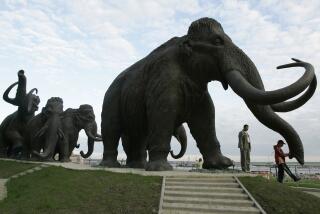Alan Mootnick dies at 60; gibbon expert and conservationist
- Share via
Alan Mootnick, a self-taught primate specialist who rose to become a leading authority on gibbon biology and conservation, died Friday at Cedars-Sinai Medical Center in Los Angeles of complications following heart surgery, relatives said. He was 60.
A self-described modern-day Tarzan, Mootnick founded the nonprofit Gibbon Conservation Center in Santa Clarita in 1976. In interviews, he stated that his aim was to advance the study, propagation and protection of the endangered species. Professional primatologists said he succeeded in doing that. The center today is home to the largest and rarest group of gibbons in the Western Hemisphere.
“This was a man who was completely dedicated to these animals,” said Mootnick’s cousin Geri-Ann Galanti, an anthropologist and board member of the gibbon sanctuary. “He gave his life to them.”
Mootnick wrote dozens of scholarly papers for peer-reviewed publications, including the International Journal of Primatology. His recent articles illuminated the world’s rarest gibbon species — the crested gibbon of China and the silvery gibbon of Java — according to Lori K. Sheeran, professor of anthropology and director of the Primate Behavior and Ecology program at Central Washington University.
“Alan was widely sought out for his expertise in the captive care of gibbons and siamangs [an endangered primate], and he shared his knowledge widely,” Sheeran said in an email.
He offered advice to U.S. zoos, veterinarians, gibbon rescue centers, government agencies and staff working at primate facilities in other countries.
“He was always incredibly generous with information and his knowledge,” said Jennifer Chatfield, a retired primate keeper at the Los Angeles Zoo. “He helped open peoples’ eyes about gibbons.”
Craig Stanford, a professor of biological sciences and anthropology at USC who traveled to Asia with Mootnick in 2005 on a gibbon consulting trip, said Mootnick sometimes felt insecure in the presence of primatologists who had academic degrees and titles.
“In the end, the best testament to them was that he did succeed in becoming a world authority on these animals, without having the formal training,” Stanford said. And “he filled a niche that no one else really occupied in the field of conservation.”
An eccentric and soft-spoken man known for his gray-spotted beard, love of suspenders and dry sense of humor, Alan Richard Mootnick was born Jan. 23, 1951, and grew up in Encino.
His father was an accountant and his mother assisted with his father’s work. Both parents died when Mootnick was a teenager.
Mootnick’s formal education consisted of a diploma from Birmingham High School in the San Fernando Valley and a two-year course in dental technology at Los Angeles City College. He loved to work with his hands and in the 1970s took up welding. In 1980, he started a painting and remodeling business.
But Mootnick’s true passion was primates.
Typically reserved, he “couldn’t stop talking when it came to gibbons,” said Chatfield.
The interest stemmed from his fascination with the fictional character Tarzan. The sound of a gibbon “singing” at a zoo captivated him when he was 9.
“I also identified with them,” Mootnick said in a 2008 Los Angeles Times interview. “I saw similarities in myself. I was lean, and agile, and comical.”
In 1976, Mootnick acquired his first ape, Spanky; she had been someone’s pet. Two years, later he got Chan Chan on loan from a Rhode Island zoo as a breeding partner. Proceeds from his remodeling business and the sale of a classic Jaguar car collection funded the 1980 purchase of the five-acre Bouquet Canyon site of the gibbon center.
“He stuck to the vision he had when he was a little kid and made that into a reality,” said Julie Taylor, Mootnick’s girlfriend and publicist.
Today, 44 apes live in hand-built enclosures and are fed customized nutritional supplements, according to staff at the facility.
“Sadly, these rare and beautiful apes have lost their strongest advocate,” said Sheeran, the anthropology professor.
Funeral services for Mootnick, who is survived by a sister, Ronnie Weinberger, will be held at 10 a.m. Tuesday at Groman Eden Mortuary in Mission Hills.
More to Read
Start your day right
Sign up for Essential California for the L.A. Times biggest news, features and recommendations in your inbox six days a week.
You may occasionally receive promotional content from the Los Angeles Times.







